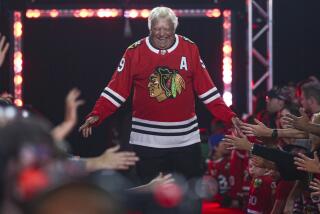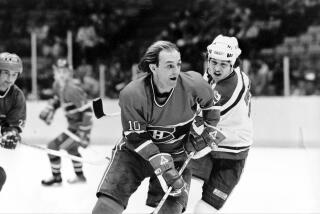Jean Beliveau dies at 83; hockey star won 10 Stanley Cups as a player
- Share via
Jean Beliveau, whose regal bearing and scoring prowess made him a symbol of the Montreal Canadiens and their long-gone days of hockey greatness, died Tuesday in Montreal, the club confirmed on its Twitter feed. Beliveau was 83 and had suffered a variety of health problems the last few years, including a stroke in 2012 and pneumonia earlier this year.
At 6 feet 3, Beliveau was considered a giant when he made his National Hockey League debut in the 1950-51 season, but he soon stood out as a physical but stately presence in a rugged sport. A 10-time all-star at center, he scored 507 regular-season goals to rank third in NHL history at the time of his retirement. He was twice voted the league’s most valuable player during the season and once during the playoffs.
He won the Stanley Cup 10 times as a player, the last five as captain of the sport’s most successful team and a cultural icon in heavily French-speaking Quebec. He was the Canadiens’ captain for 10 years.
Beliveau retired after the Canadiens defeated the Chicago Blackhawks in a memorable, seven-game final series in 1971 and was inducted into the Hockey Hall of Fame the following year. He continued his extensive charity work and was appointed a vice president of the Canadiens, getting his name engraved on the Cup seven more times. He relinquished his duties in 1993 but continued to serve as a revered team ambassador.
“I guess you could say I’ve spent my life with this team,” he told Canada’s Globe and Mail newspaper in 2009. “There are a lot of people who still see the Canadiens as a representation of themselves and the fans invest their emotions and identities, especially when it’s going well.”
Born Aug. 31, 1931, in Trois Rivieres in the province of Quebec, Beliveau started skating on a sheet of ice in his backyard when he was 3 or 4 years old. His father, Arthur, worked for the local power company. His mother, Laurette, installed linoleum on the kitchen floor so Jean and his siblings could keep their skates on when they came indoors for lunch.
The Canadiens noticed him when he was a young teenager and tried to sign him but his father balked. Young Beliveau went to play junior hockey in Quebec City and stayed there in the senior amateur ranks until Canadiens executive Frank Selke had the idea of buying the league and turning it into a professional operation, which allowed him to secure Beliveau’s playing rights.
Beliveau signed a five-year contract for the then-exorbitant amount of $100,000. He faced enormous pressure but didn’t become a regular in the Canadiens’ lineup until the 1954-55 season, when he scored 37 goals and 73 points in 70 games. He won his only scoring title in the 1955-56 season and added 12 goals and 19 points in 10 playoff games to lead the Canadiens to the first of five consecutive championships, a record that might never be broken.
In today’s game a player of his ability would earn multimillion-dollar paychecks, but Beliveau never begrudged the riches earned by those who followed. He became a mentor to many of Montreal’s young players, including superstar Guy Lafleur.
“I think me and my contemporaries sowed a lot of seeds and other people are reaping the harvest today,” he told the Globe and Mail in 1993. “I’m happy to see these kids do well, but I always hope they will remember their responsibilities to the fans.”
A popular figure at golf tournaments, old timers’ games and other events, Beliveau was renowned for his charitable works and raised millions of dollars for children’s causes. When he closed his charitable foundation in 1993 he gave $900,000 to the Quebec Crippled Children’s Assn. on the condition that all the money would go to a summer camp and not for salaries or administrative costs.
Beliveau was occasionally approached about taking on a public office but never did so. He turned down a chance to become Canada’s governor general because he and his wife, Elise, were helping raise their granddaughters after the suicide of his son-in-law.
He is survived by Elise, his wife of 61 years; their daughter, Helene, and granddaughters Mylene and Magalie.
More to Read
Start your day right
Sign up for Essential California for the L.A. Times biggest news, features and recommendations in your inbox six days a week.
You may occasionally receive promotional content from the Los Angeles Times.






